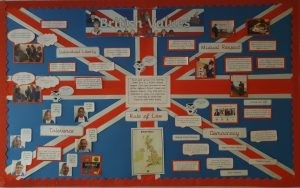British Values
The Department for Education has recently stated the need to:
‘create and enforce a clear and rigorous expectation on all schools to promote fundamental British values of democracy, the rule of law, individual liberty and mutual respect and tolerance of those with different faiths and beliefs’
This means that our Academy curriculum must actively promote these fundamental British values and we have addressed this in the following ways:
